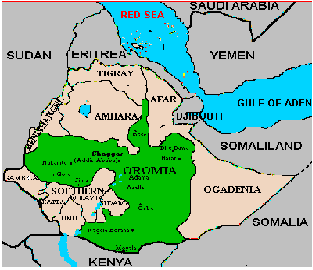By Observer
Given the pitiful state in which the
Oromo struggle for liberation finds itself today, I am always eager to listen
to anyone who has any idea or suggestion on how we can surmount the complex
challenges we are faced with. When I heard that “Waltajjii Marii Oromoo” or
“Oromo Dialogue Forum” would be coming to a city near me on 9/22/2012, it was
an easy decision for me to drive a few hours and hear what they had to say for
two reasons. First, as a firm believer in dialogue among Oromo political actors
and public, I wanted to contribute my two cents worth on the challenges we are
facing and possible solutions and listen to other compatriots’ ideas and
suggestions. Secondly, I was attracted to one of the topics of the forum which
was “A new vision to renew the Oromo liberation struggle.” This particular
topic brought many questions to my mind: What would this new vision be? Would
it be a vision to bring about unity among Oromo political actors and
organizations? And many more!
So, having attended the meeting, did I
get a chance to contribute my two cents worth? Did I hear a new vision? What
follows is my personal reflection.
However, the Washington DC ODF
“dialogue” forum was hardly a forum for dialogue in the true sense of the word.
If the purpose was to have a true dialogue to identify the deeply divisive
political and other issues among Oromo political actors, to listen to competing
views and to build a more constructive and collaborative relationship among
them, then the OFD Washington DC forum has failed miserably.
The ODF meeting I attended in
Washington DC was no different from the ones conducted by the OLF and other
Oromo political organizations except in two regards. The first is that they
called their meeting a “dialogue” forum which it was not for reasons provided
above. Secondly, they claimed that they have not formed an organization nor do
they have any intention to form one. I find these two assertions very
misleading which I will address a few paragraphs down.
According to the opening
remarks by one of the presenters, the ODF traces its genesis back to
“Bu’ureessitoota fi miseensota buleeyyii ABO”. This is a group consisting of a
couple of founders and some longtime members of the OLF that was formed in Dec.
2008 purportedly to try and reconcile the various factions of the OLF. Many suspected the
true intention of this group at the time. The fear was that they might be using
the reconciliation effort as a pretext to form another political organization.
This was feared because it is widely believed by Oromos that there are already
too many political organizations (basically little fiefdoms) and breeding more
would worsen an already bad situation. By limiting or reducing the number of
Oromo political organizations, the Oromo hope to reduce their internal
squabbles which have consumed their time and energy that should have been
expended on fighting the enemy. They are also mindful of the fact that the
mushrooming of organizations would be to the detriment of pulling Oromo scarce
resources together to give the nation a fighting chance against their
colonizer.
It is obvious to all intelligent
attendees of their meetings that they are already a political organization to
which they have the right. In the Washington DC
meeting, they presented their political manifesto; they even distributed survey
questionnaires that asked attendees whether they agree with their views or not
and whether they would like to become members or just supporters.
However, when asked if they already are, or in the process of forming, an
organization, they denied that they are or plan to. There was no need to insult
their audience’s intelligence. What happened to telling the truth and earn the
trust of those they are targeting for recruitment? As it is, trust is in short
supply in the Oromo struggle. Why make it worse, if they are really trying to
make a difference?
The organizers and presenters
of the ODF in Washington DC were all former leaders of the OLF. In fact, some
of them are founders. Each of them held positions of leadership including
chairmanship, deputy chairmanship, membership in the central committee and
spokesmanship of the organization and heading the foreign affairs department at
different times and for extended periods of time. In effect, these are
former leaders campaigning for a second chance to lead an Oromo liberation
organization. Whether that organization is one to be formed soon or another
faction of the OLF to be announced only time will tell.
This group of former leaders
agrees on two things: (a) that the OLF has failed to rally the Oromo people to
achieve its objective; (b) that they don’t share any blame in OLF’s failure.
While their first assertion has some truth – that the OLF has failed in its
mission – I find it a turnoff that former leaders of their stature blame their
organization’s failure on circumstances (the usual old excuses) and their
former comrades in arms while exonerating themselves. They have made themselves
self-appointed judges, jury and the prosecutors in the OLF failure saga.
ODF has all the makings of an
active political organization vying for Oromo attention. With its manifesto of
democratization of Ethiopia, it shall be sharing Oromo political space with
OFC, the Kemal Gelchu group and other forces. Don’t insult your audience’s
intelligence. Don’t present it as a “dialogue” forum which it is not. Come out
and introduce your organization for what it is—a budding political
organization.
As former leaders of the OLF,
admit personal failure for the organization disintegrated under your watch. Tell us what you have
learned from your failures and what you would do differently before asking the
Oromo people to follow you again.
Nagaa Oromummaa wajjin,

